Salesforce Pardot review
Pardot is cloud-based B2B marketing automation software provided by Salesforce. Build, automate, and analyze marketing campaigns with this powerful B2B marketing tool. Read our full Salesforce Pardot review to learn how to power your B2B marketing campaigns with Salesforce, one of the best CRM software solutions available.
Salesforce Pardot CRM review: Snapshot
Salesforce Pardot is a B2B marketing platform that is fully integrated with the Salesforce suite of products. It features marketing automation, lead management solutions, and industry specific subproducts.
All automation and lead management solutions provided by Pardot are supported by Einstein, Salesforce’s AI solution. Einstein automatically qualifies your Pardot leads with a behavioral scoring system, which escalates priority leads to marketing for follow-up. Pardot’s marketing automation features center on a visual drag-and-drop journey builder for email marketing campaigns that’s intuitive to use and doesn’t require coding.
Pardot has a high price point relative to its competition, starting at $15,000 annually for its basic tier, Grow. We found that while the Grow tier is expensive relative to competing products, the highest pricing tier, Premium, is justifiably priced thanks to its features and the number of marketing contacts it provides. Large enterprises that have the budget to afford a Premium Subscription can unlock unparalleled digital marketing capabilities. Smaller organizations, however, are best suited with an alternative product such as HubSpot or Mailchimp.
Score: 4/5
Read on for our full and detailed review.
Today's best Salesforce Pardot CRM deal
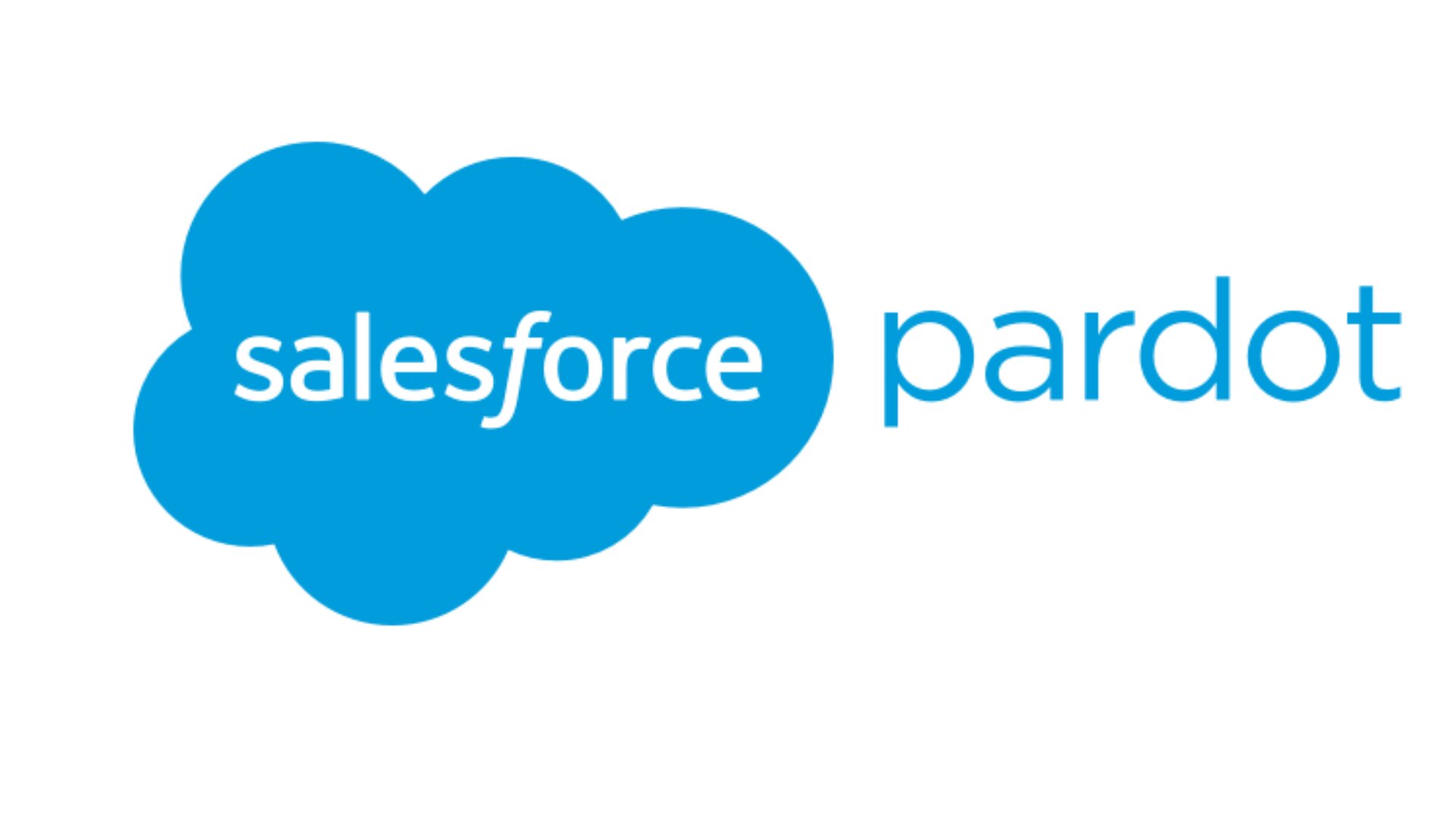
Get Salesforce Pardot CRM from $1250 / £1050 per 10,000 contacts/month
Pardot from Salesforce is a leading B2B Marketing automation CRM platform that helps fuel business growth through superior CRM features, including AI-powered data analytics. Pricing plans cover between 10,000 to 75,000 contacts depending on which you opt for.
5 reasons why a small business needs a CRM
Pardot CRM’s competitors
| Salesforce Pardot | HubSpot Marketing Hub | Mailchimp All-in-One Marketing Platform | |
|---|---|---|---|
| Score | 4/5 | 4.5/5 | 4/5 |
| Pros | - Incredible breadth of B2B marketing features - Industry specialized solutions for financial services, healthcare, manufacturing and media. | - Established platform with over 300 third-party apps available - Easy integration with Salesforce | - Great for small business and solo users - Free version available |
| Cons | - Very high cost - Limited customer support for its price level | - Long setup time, 8-12 weeks | - Poor list management —limited to 5 positive or negative conditional relationships - No A/B testing for landing pages |
| Verdict | Pardot is powerful and expensive B2B marketing software with a wide range of features. It is worth your consideration if you can afford one of the top two pricing tiers. | HubSpot marketing hub is adequate as a B2B marketing platform, and also supports B2C. Pricing is midrange, as is the available set of features. | Mailchimp is a versatile B2B or B2C marketing platform. You can start off very small, with pricing under $10 monthly, then scale easily as your needs increase. |
| View deals | Visit site | Visit site | Visit site |
Pardot CRM’s key features
Lead Generation and Management
Pardot provides you with easy-to-use tools for constructing forms and landing pages. Everything is done through a visual drag-and-drop interface, so coding expertise is not required. Hosting for landing pages and forms is included in your Pardot subscription.
Pardot’s lead management system automatically scores leads based on their interactions with your landing pages and forms, and forwards the most promising leads to the marketing team for follow-up.
Email Automation
Email campaigns can be automated easily with a simple visual drag-and-drop interface. As with the landing page builder, no coding knowledge is required. You can use Pardot to quickly design email templates or even tweak one of its premade templates for your own use.
After that, fully automate your email campaign with scheduled sending and autoresponders for your forms and landing pages.
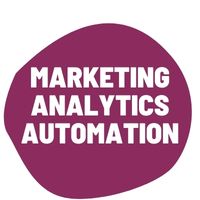
Learn more in our article: What is B2B marketing automation? | A small business guide to automated digital marketing.
Marketing Analytics
Pardot generates reports at every step of the marketing funnel. The reports are fully customizable, but the default offering should be enough for most marketing teams. Out of the box, Pardot will be able to estimate the ROI of your marketing campaigns and show you their impact on sales revenue. It also tracks customer engagement, and if you have Salesforce Sales Cloud, integrates data from it.
This way, both marketing and sales leads are included in Pardot’s analytics.
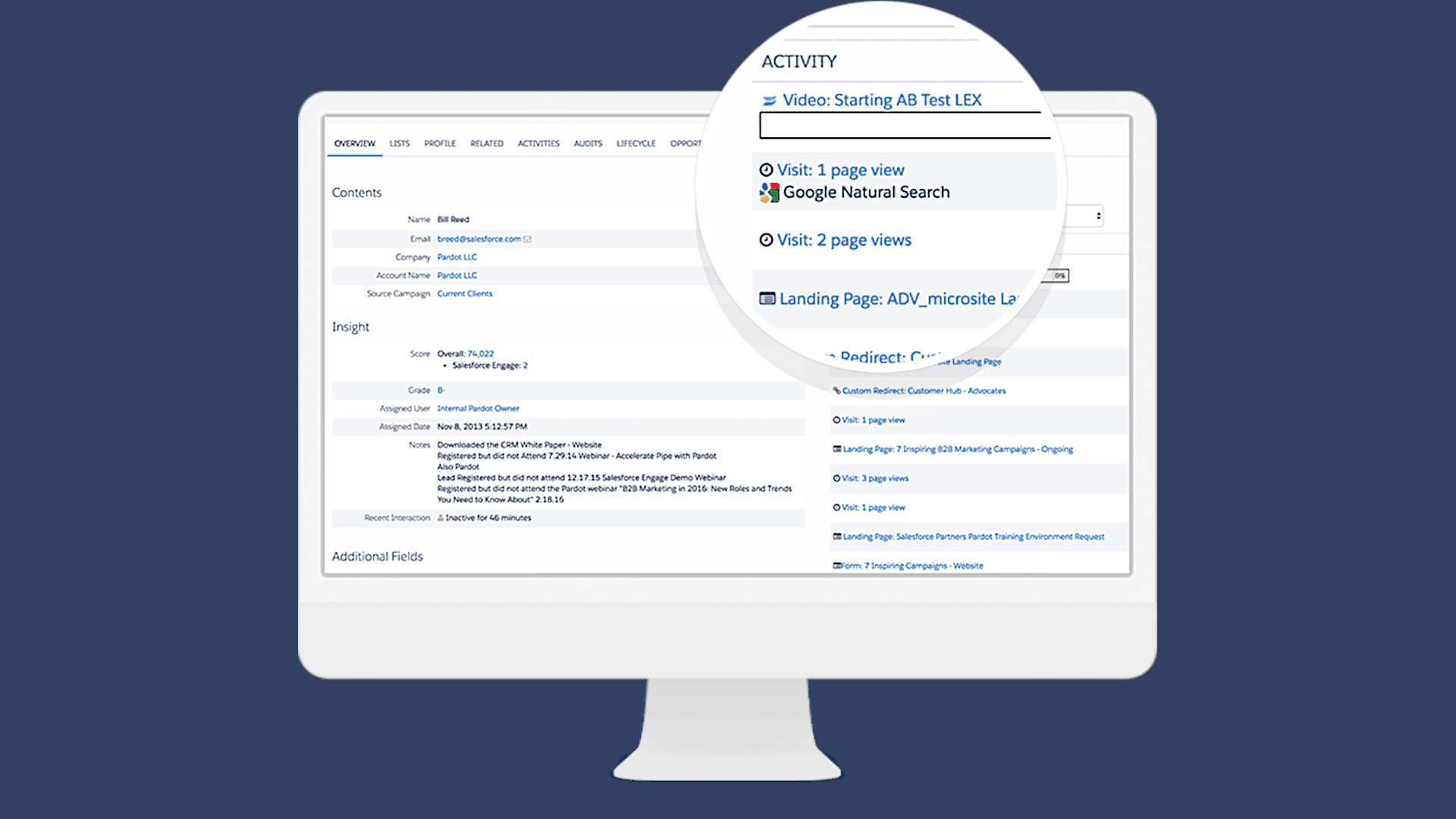
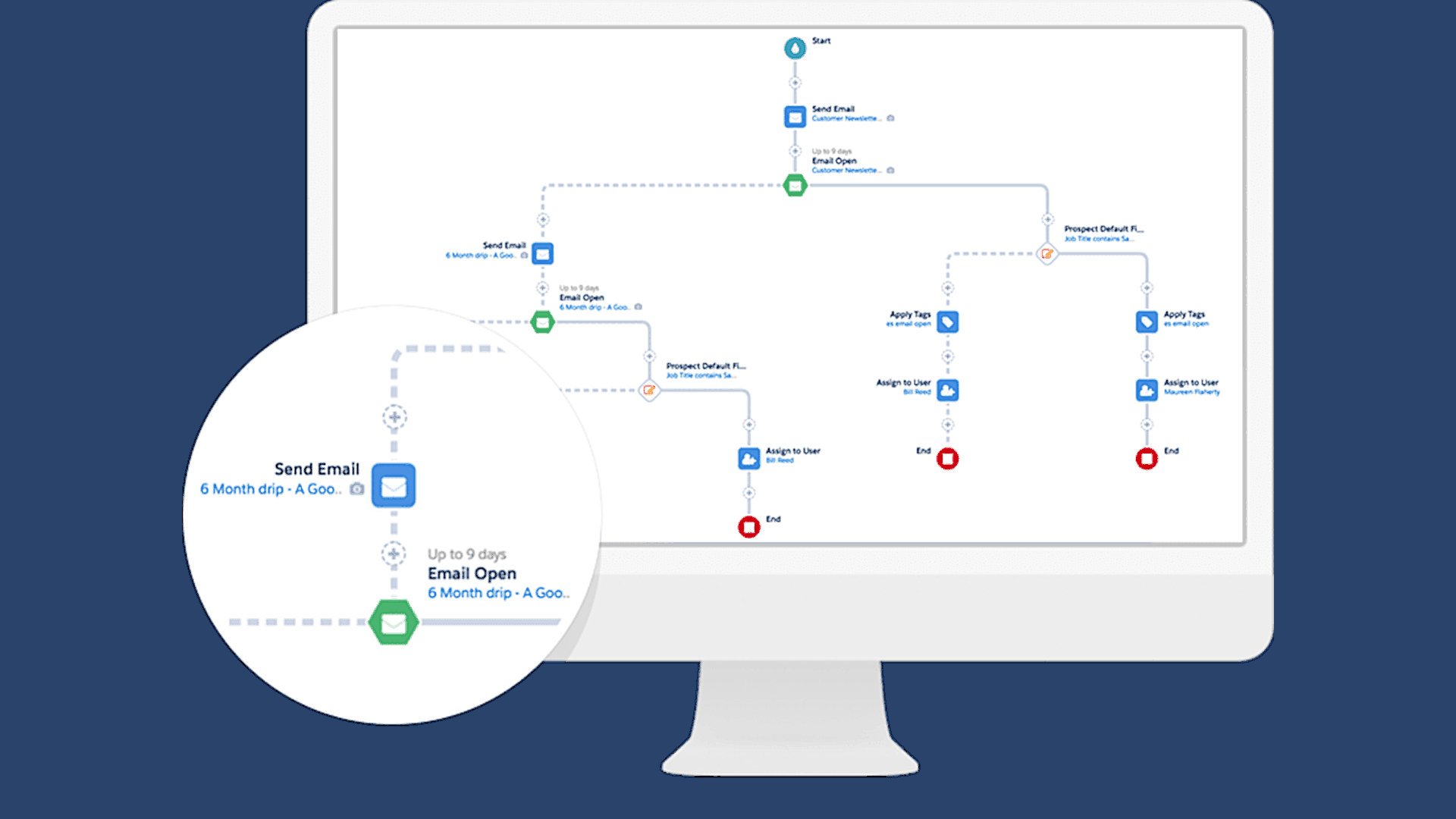
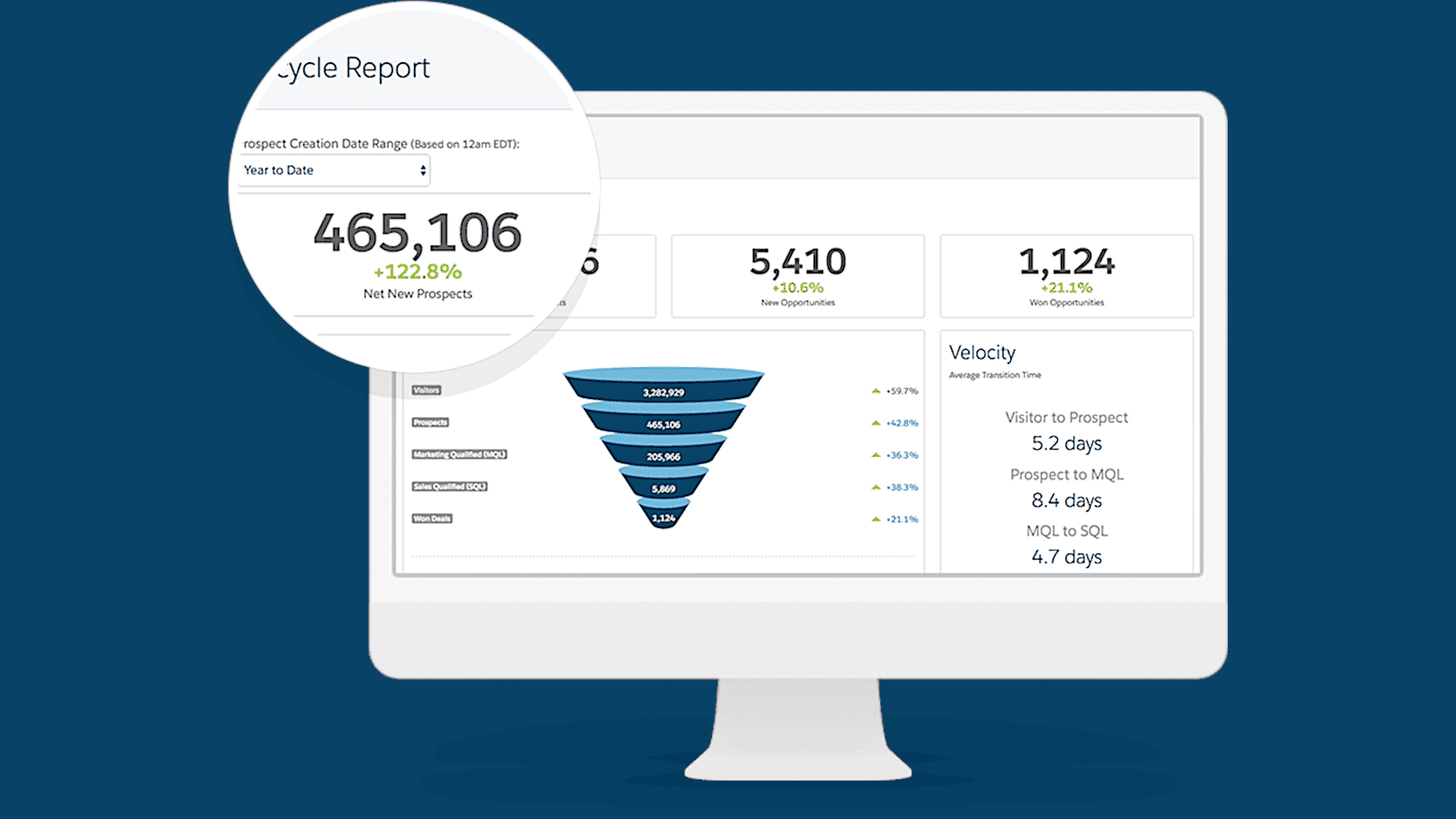
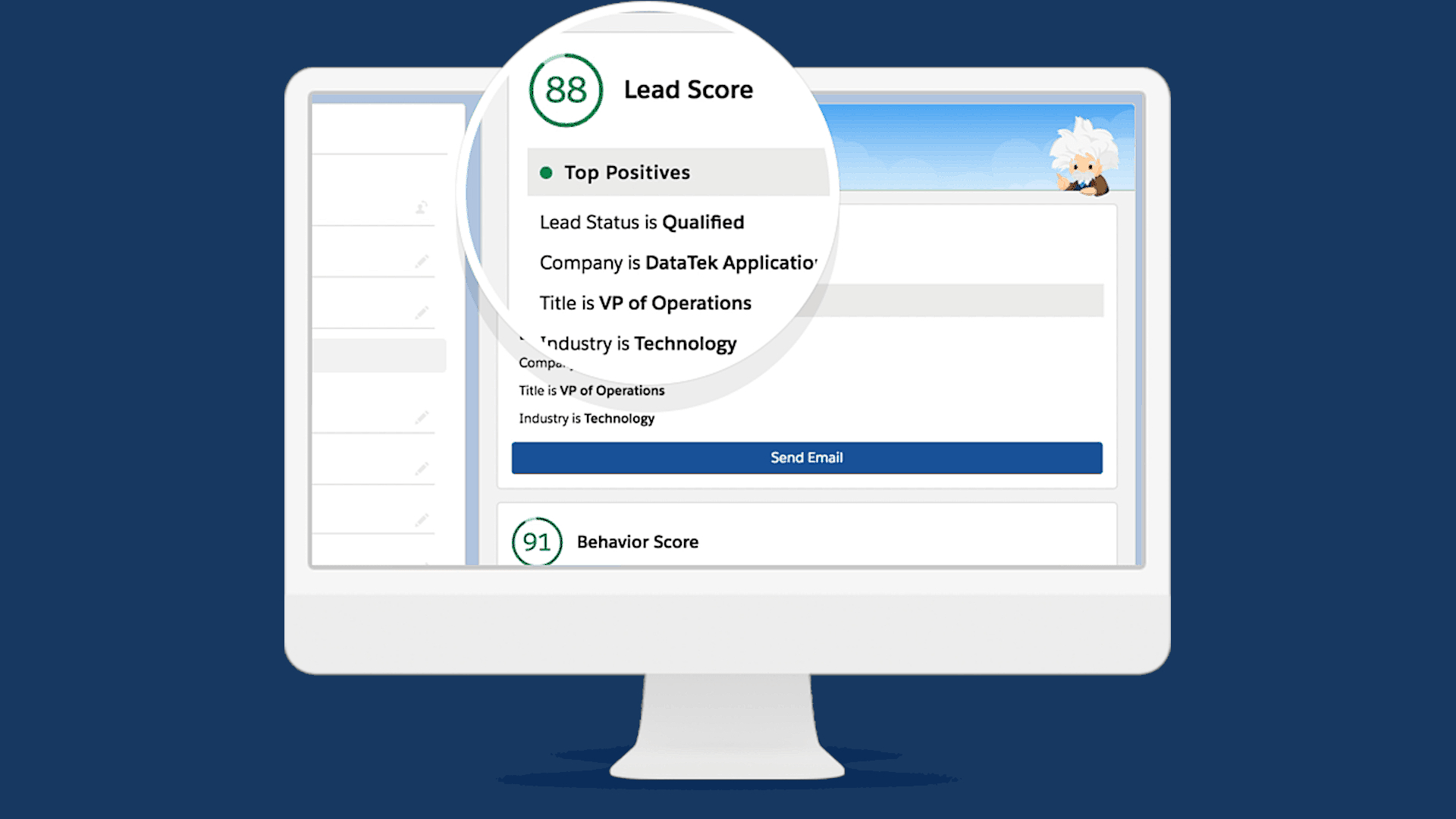
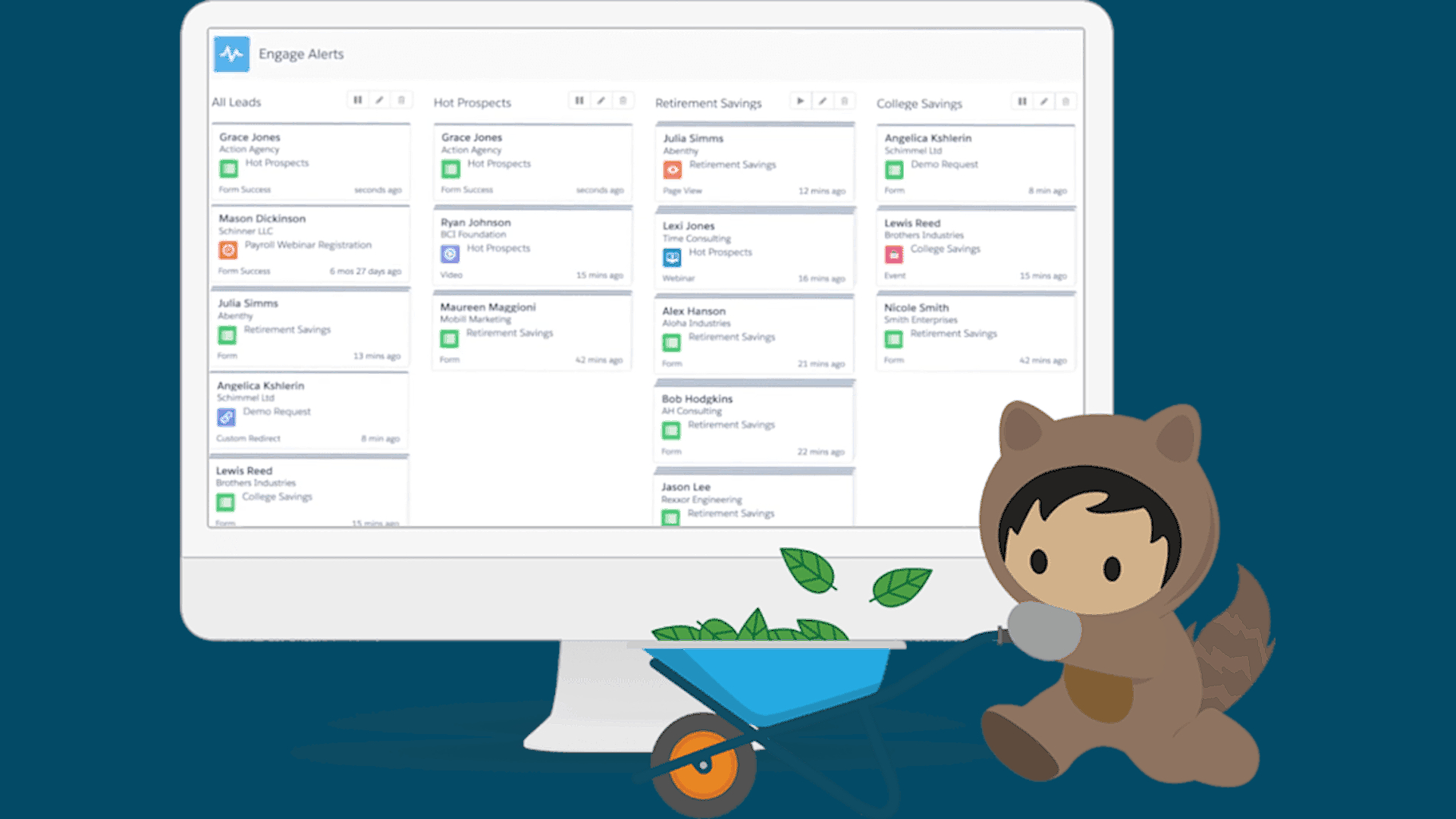
AI-Driven Solutions
Salesforce’s Einstein AI supports Pardot by scanning your Sales and Marketing lead databases and identifying key leads. These leads are determined by their level of interaction and engagement with your brand.
Einstein then connects leads with any existing records in your Salesforce database and makes intelligent suggestions to your marketing and sales teams on how to best go about converting these leads into customers.
Industry Specialized Solutions
In addition to a powerful generalized platform, Pardot provides industry-specialized marketing automation services for B2B marketers in the fields of financial services, healthcare, manufacturing, and media.
For example, Pardot for Financial Services automatically attempts to identify individuals with the best investment potential for your financial institution based on preset criteria, while Pardot for Manufacturing features lead capture, automated follow-up, and ROI tracking for trade shows.
Pardot CRM: What’s new?

In its spring 2021 release, Pardot made numerous improvements to its email marketing system. Notably, marketers can now implement two-click unsubscribe, meaning customers now need to click Yes in a separate confirmation window to unsubscribe from an email list. This prevents unsubscribing bots from auto-removing leads, and boosts retention.
This release also overhauled Pardot’s setup process through the addition of the Salesforce Marketing Setup App. The app groups all the required tasks to set up Pardot in its standard configuration in one place, making it faster and easier to set up this complex piece of software.
Behavioral scoring, powered by Einstein AI, is also a new feature from the spring 2021 release. With this feature enabled, Einstein will automatically assign a behavior score to marketing leads based on their level of engagement with your digital marketing channels.
A lead with higher engagement will have a higher score, and leads with a sufficiently high score will be automatically escalated to your marketing department for follow-up.
Pardot CRM: Pricing
Pardot offers four tiered pricing options, billed at a flat rate on an annual basis. Pardot, like most Salesforce products, is priced on the expensive end of the market, but it also offers a broad range of features that justify its price point.
This pricing model makes Pardot ideal for enterprise users who have a plentiful budget and are looking for numerous features along with significant numbers of available marketing contacts. Users who are willing to accept fewer features in exchange for a lower price point would be better suited with an alternative provider like HubSpot or Mailchimp.
| Plan type/feature | Growth | Plus | Advanced | Premium | HubSpot Marketing Hub Starter | Mailchimp All-in-One Marketing Platform Essentials |
|---|---|---|---|---|---|---|
| Cost per month | $1250 | $2500 | $4000 | $15,000 | $45 | $9.99 |
| Cost per year | $15,000 | $30,000 | $48,000 | $180,000 | $540 | $119.88 |
| Monthly Marketing Contacts | 10,000 | 10,000 | 10,000 | 75,000 | 1000 | 500 |
| A/B Testing | ✓ | ✓ | ✓ | ✓ | ✓ | Emails Only |
| AI Support | X | X | ✓ | ✓ | X | X |
| 24/7 Phone and Chat Support | X | X | X | ✓ | X | Chat Only |
Testing Pardot CRM
We tested Pardot’s ROI calculator tool, which attempts to showcase how Pardot can increase the effectiveness of your marketing campaigns. ROI is a key performance indicator (KPI) for many marketing teams, so it is important to know if Pardot’s ROI calculator is accurate.
How accurate is Pardot’s ROI Calculator?
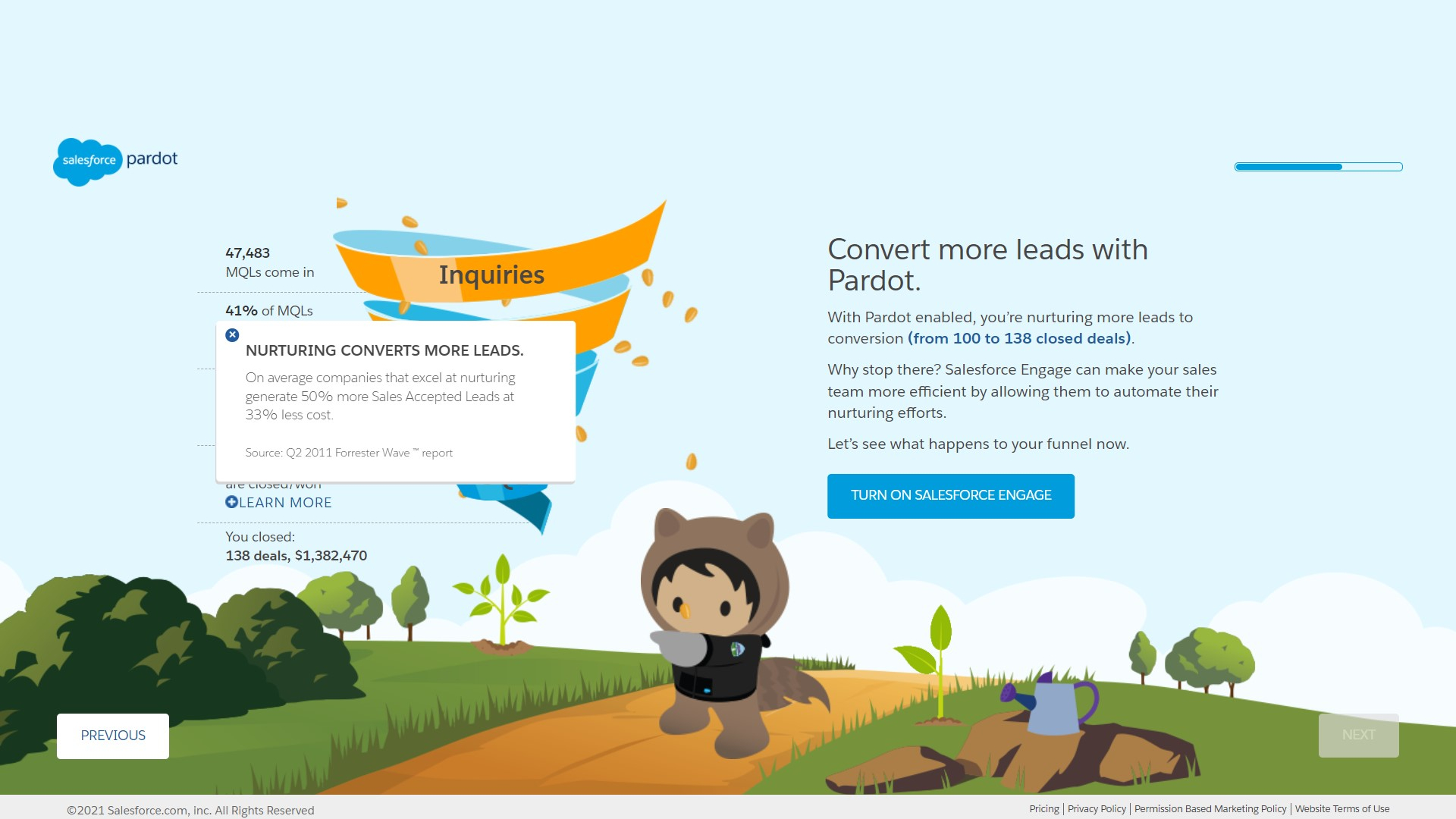
Pardot’s ROI calculator attempts to estimate the total return your organization will experience by adding Pardot automation to its marketing process.
We input some basic information for a hypothetical company, and the calculator stated that with marketing automation, our annual revenue would increase by about 155%.
The calculator then stated that without Pardot only about 27% of incoming leads were sales ready, while the remaining 73% would need to re-enter the marketing funnel. However with Pardot, the number of Sales qualified leads jumped to 41%.
These numbers came from two separate sources. The 27% came from an unspecified 2012 MarketingSherpa report. The 41% came from a generic statement from the Q2 2011 ForresterWave report, which said that companies which excel at lead nurturing generate 50% more leads.
The above statement is generic, and there is no guarantee that adopting Pardot would actually make your company generate 50% more leads. For this reason, we do not recommend using Pardot’s ROI calculator as a predictive tool.
Alternatives to Pardot CRM
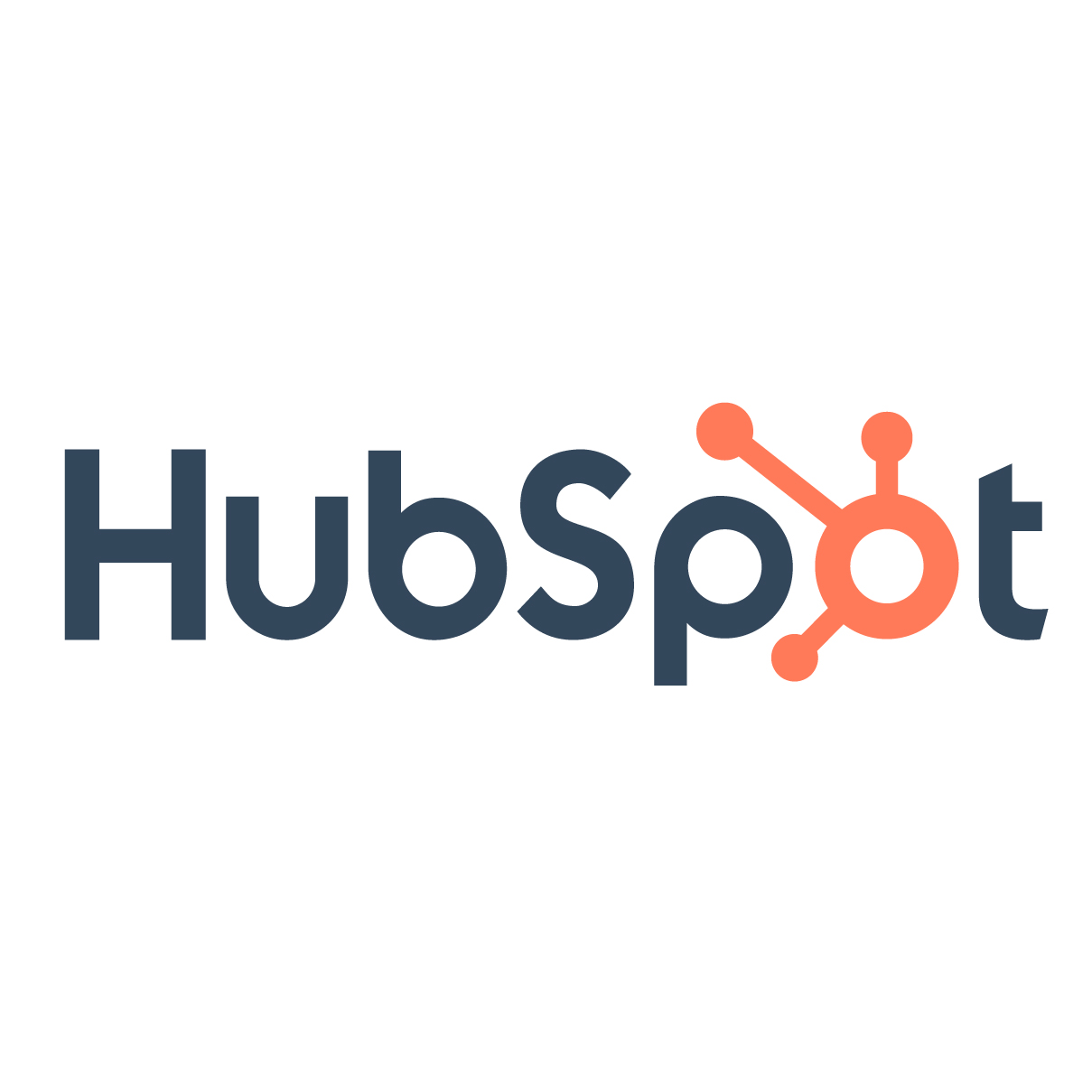
Pardot is an expensive but feature-heavy product, with competitors like Mailchimp and HubSpot CRM fulfilling a more budget-friendly, yet limited role.
From a cost perspective, Mailchimp’s All-in-One marketing platform is one of the cheapest marketing platforms available. Unlike Pardot, it has a free tier, which gives users access to a Marketing CRM and a form and landing page builder.
Mailchimp’s paid tiers unlock features and increase in price based on the number of contacts you wish to unlock. The cheapest paid plan, Essentials, costs $9.99/month for 500 contacts, and unlocks 24/7 email support and A/B testing.
Mailchimp is a great marketing platform for small business users, as they can start for free, then scale easily based on business needs. Learn more in our Mailchimp review.
HubSpot’s Marketing Hub is another alternative to Pardot. It features a free tier similar to Mailchimp’s, with a marketing CRM and builders for forms and landing pages. It also comes with traffic and conversion analytics, a feature that is not present in Mailchimp.
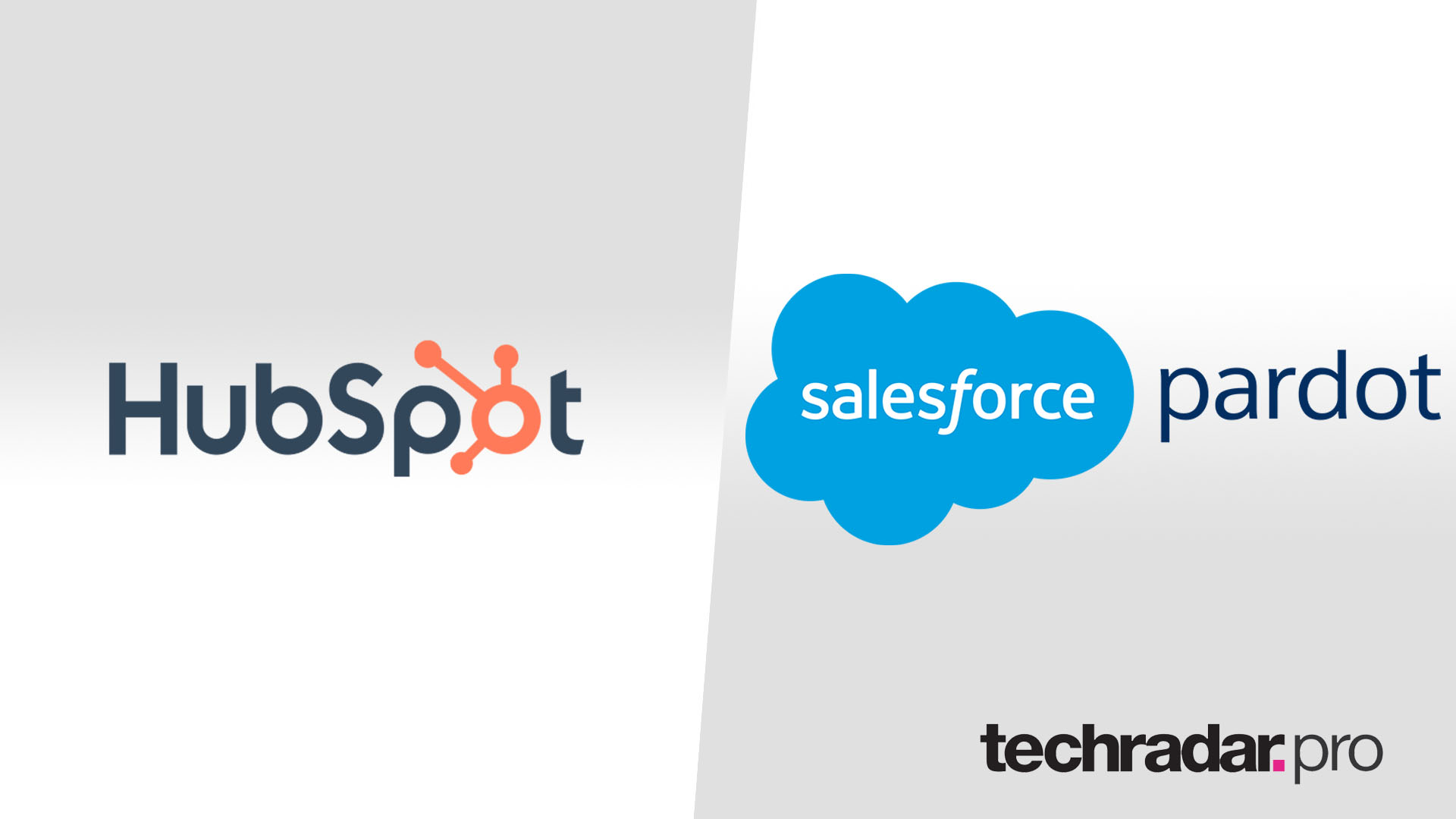
Read our Hubspot vs. Pardot CRM review for more side by side comparison of features and pricing.
HubSpot’s paid tiers unlock numerous features that are not included in Mailchimp, like live chat and landing page analytics. Essentially, HubSpot’s Marketing Cloud has more features than Mailchimp, but also costs more in each paid category. Checkout our full Hubspot CRM review for more details.
Both platforms at their highest paid tier are roughly comparable to Pardot’s lowest paid tier, Grow, and should be useful for most small business marketing needs. However, they do lack Pardot’s high-powered analytics options.
For instance, Pardot's behavioral scoring uses machine learning and encompasses landing pages, emails, social media, and every other point of contact, while Mailchimp's is very basic, only comparing how many links customers click on in your emails vs the number of emails you send.
| Salesforce Pardot | HubSpot MarketingHub | Mailchimp All-in-One Marketing Platform | |
|---|---|---|---|
| Number of marketing contacts/month | 10,000 | 1000 | 500 |
| Salesforce integration | Yes | Yes | Yes |
| Support | Email support with a 2-day turnaround time | 24/7 chat and email support | 24/7 chat and email support |
| Basic plan | $1250/mo | $45.00/mo | $9.99/mo |
Pardot: Final verdict
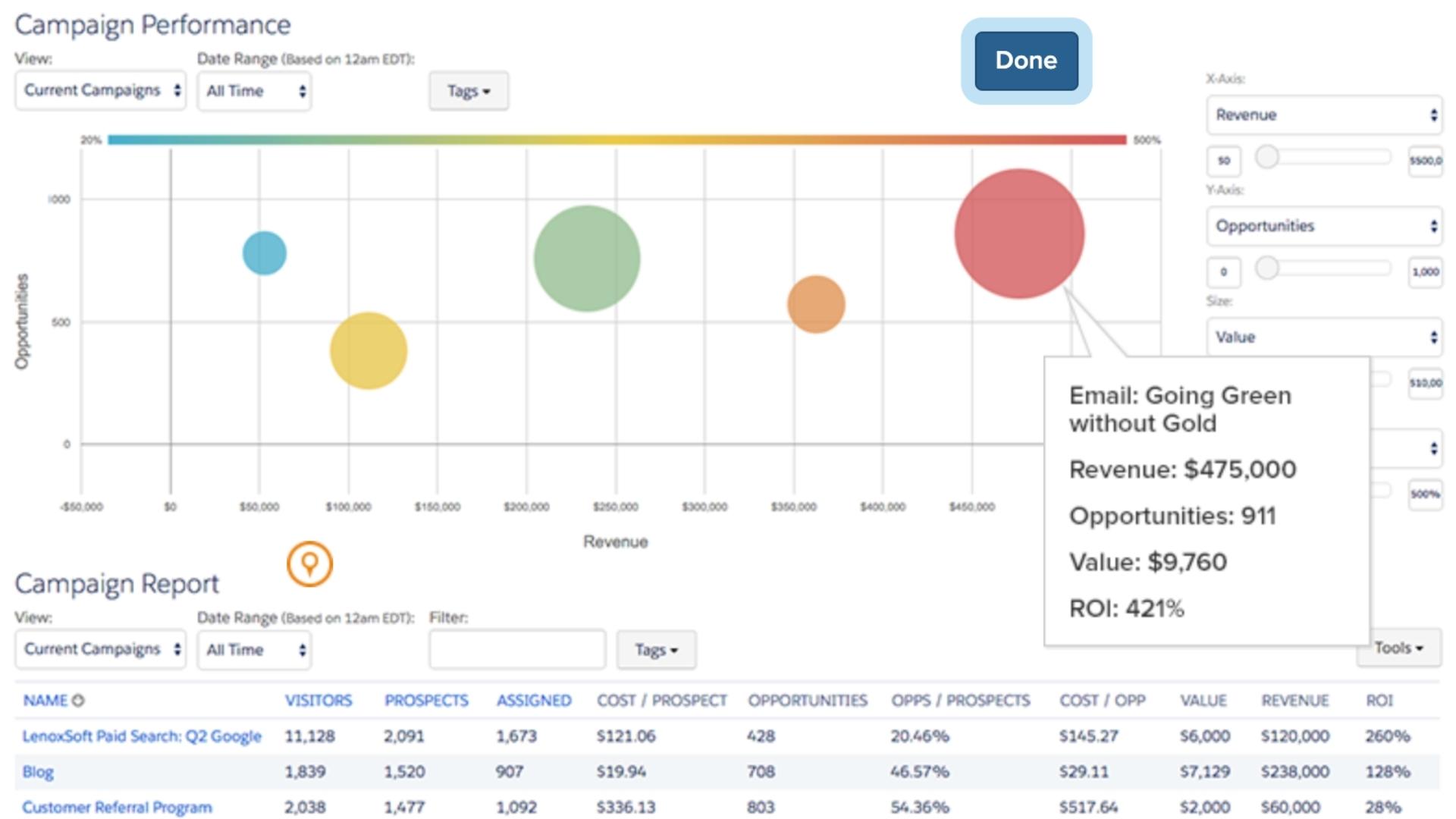
Pardot is incredibly powerful B2B marketing software. At its highest pricing tier, you can run campaigns on 75,000 contacts/month, with best-in-class, AI-powered reporting and a powerful suite of automation features.
Its high price point limits its usefulness to very large enterprise clients—at its lower price tiers, it costs 10–30 times more than competitors for a similar set of features. Businesses unable to take advantage of Pardot’s massive scale will find it more economical to go with another provider, such as Mailchimp.
Moreover, customers must pay an additional 30% for a Salesforce Premier Success plan in order to receive 24/7 phone and chat support. Alternative providers, such as Mailchimp and Hubspot, have some form of 24/7 support built into their default offering. Technically, Pardot does too, but only for its most expensive license, the $186,000/year Premium plan.
For users that can afford a Premium Subscription, Pardot offers unparalleled power, depth, and scale. So before purchasing a Pardot subscription, consider your budget and needs. Once you need advanced analytics, over 10,000 marketing contacts, and management for multiple business units, Pardot is probably your best option. If you can afford to purchase the Premium, or at the very least the Advanced price tier, you will be getting the biggest bang for your buck.
If not, then stick to another provider, as Pardot’s lower tiers are limited and priced significantly above market for what they offer.
Further reading
Learn more about CRM software and Salesforce with our guides What is CRM software and What is Salesforce. Afterward, read How to set up Salesforce with Tableau and How to set up Slack to Salesforce Integration to expand your Salesforce experience with analytics and a business communication platform.
0 comments:
Post a Comment